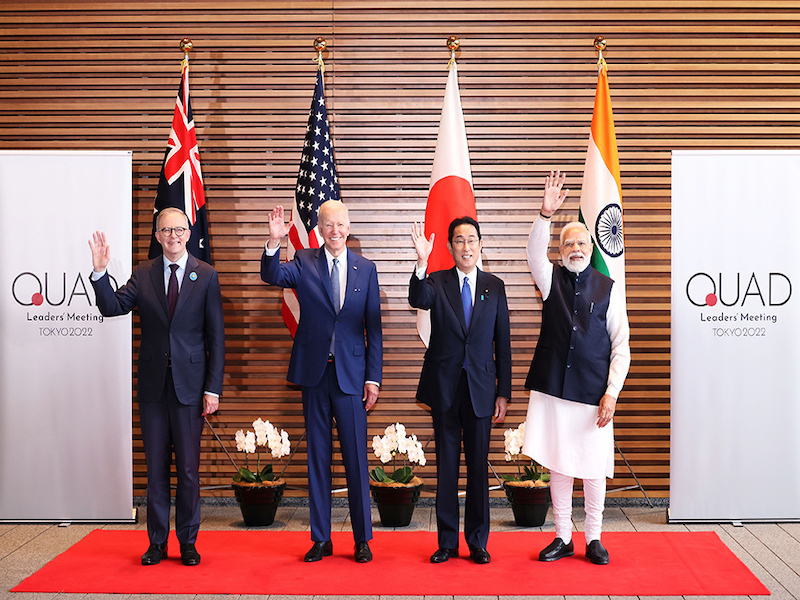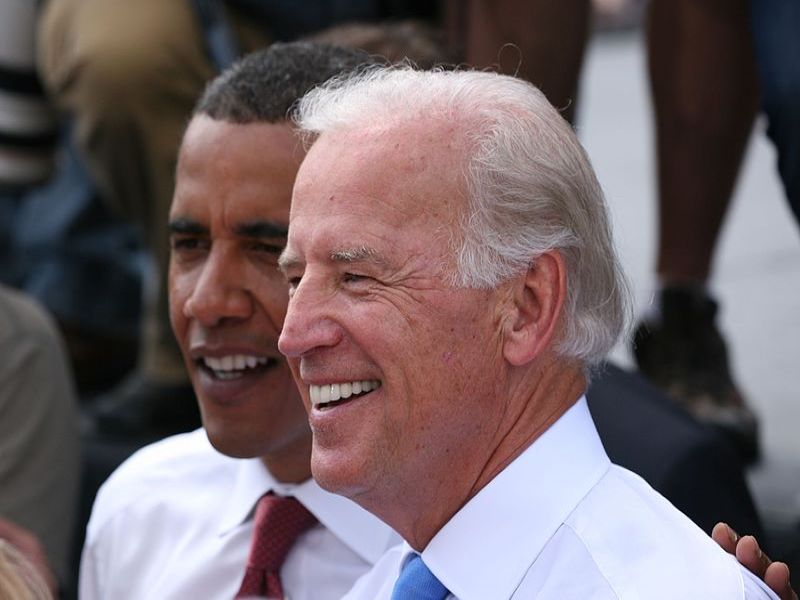On May 24, 2022, U.S. President Joe Biden, Indian Prime Minister Narendra Modi, Japanese Prime Minister Fumio Kishida, and the newly elected Australian Prime Minister Anthony Albanese met for the fourth Quad meeting to discuss, among other issues, ensuring a “free and transparent” Indo-Pacific. In a joint statement released by the Japanese Foreign Ministry, the Quad has committed to “extend[ing] more than USD $50 billion of infrastructure assistance and investment in the Indo-Pacific, over the next five years.” However, previous promises of economic assistance have not prevailed, resulting in the Quad’s failure to establish itself as a viable alternative to China’s Belt and Road Initiative in the South China Sea. The Quad must shift its focus to improving economic assistance in the Indo-Pacific region to counter China’s rise.
The Quadrilateral Security Dialogue, commonly referred to as the Quad, consists of Australia, Japan, India, and the U.S. Formed after the 2004 Indian Ocean tsunami and earthquake to coordinate disaster relief efforts in affected areas, the alliance was reinitiated in 2017 with the aim of ensuring a “free and transparent Indo-Pacific.” Following its resurgence, the Quad held its first counterterrorism exercise in India to “assess and validate CT response mechanisms in the light of emerging terrorist threats as well as to provide opportunities to share best practices.” In May 2022, the alliance also pledged to commence a new maritime opening initiative to shore up the surveillance of China’s activity in the South China Sea. While the alliance has committed to “quality infrastructure investment,” the last two years have experienced a decrease in ASEAN countries’ trust in the effectiveness of the alliance as efforts by the Quad have remained limited to increasing military presence in the region by attempting to secure the backing of ASEAN countries while not providing economic security.
In 2020, the Government of Indonesia rejected a proposal from the US for the P-8 Poseidon Maritime Surveillance planes to land and refuel in Indonesia. The request was made against the backdrop of escalation between the United States and China’s activities in the South China Sea. Former Indonesian Ambassador to the U.S. Dino Patti Djalal told Reuters that the Indonesian Government was shocked at the request since the proposal reflected a “very aggressive anti-China policy” that “unnerved” Indonesia, which has historically chosen to follow a neutral foreign policy.
Some argue that China has gained momentum in the Indo-Pacific due to its Belt and Road Initiative. China now stands among the largest development donors in the Indo-Pacific, with China’s Export-Import Bank offering concessional loans to Indo-Pacific nations, which account for 80 percent of development aid in the region. Countries such as Malaysia, Thailand and Indonesia have benefited from China’s Belt and Road Initiative. During former Philippine President Rodrigo Duterte’s term, projects such as the Kaliwa Dam Project and the Chico River Project were undertaken using Chinese investment. Although labelled as controversial due to anti-China sentiments among the public and opposition parties’ concerns over the Philippines dependence on BRI, these projects aided in improving development in the Philippines. Against this background, in 2019, Filipino fishermen were injured after a Chinese vessel struck their fishing vessel, resulting in a legal battle that saw the fishermen winning USD $113,421 in compensation. Despite this act of aggression, the Philippines signed a Memorandum of Understanding (MoU) with China on a ten-year Infrastructure Development Plan. Receiving infrastructure investments from China, many Indo-Pacific countries are not willing to take an active military stand against the country. Hence, the Quad’s attempt at military exercises and an increasing naval presence in the Indo-Pacific will not be sufficient to counter China’s influence in the region.
For the Quad to succeed in gaining the support of ASEAN countries, the first step needs to be increased investment around infrastructure and connectivity. The Indo-Pacific is one of the fastest growing regions in the world, accounting for two-thirds of global economic growth. Despite this progress, USAID estimates that the region suffers economic losses worth USD $300 billion per year due to weak cybersecurity systems, e-governance and e-commerce. The COVID-19 pandemic has revealed the need for connectivity. While the Indo-Pacific region suffers from a lack of underwater cables for connectivity, island nations such as Timor-Leste pay higher costs due to their overwhelming dependency on the technological infrastructure of other countries such as Indonesia. As countries individually launch initiatives to improve economic resiliency in the Indo-Pacific and reduce the region’s dependence on China, it is imperative that the initiatives are perceived as being pursued collectively by the Quad. While the Quad has held periodic discussions on their goal of a free and open Indo-Pacific, member representatives have publicly expressed different visions for the region, resulting in the alliance not being perceived as a cohesive unit capable of replacing China’s influence.
The Quad made an ambitious promise of donating one billion vaccines to the Indo-Pacific during the COVID-19 pandemic in what could be considered an attempt to become an alternative to the Belt and Road Initiative. Japan and the U.S. had signed an agreement to finance one billion vaccines that were to be produced in India. Due to the deadly second wave that affected India’s healthcare system, India was forced to halt all exports, which resulted in the vaccines never reaching its Indo-Pacific neighbours. Instead, China stepped up to donate 454 million vaccines to Asian countries, with around 350 million of those being sent to the Indo-Pacific. The Quad’s failure became China’s opportunity, further signalling to ASEAN that the Quad could not yet be considered an alternative to China’s economic assistance.
For the Quad to be considered as a successful alternative to China’s growing influence in the region, the alliance needs to rebuild trust in the region. This can be achieved by committing to investment in infrastructure and connectivity and, most importantly, following through on those commitments. Only when the Quad can be seen as a counter to China’s influence in the South China Sea will the alliance be able to gather the support of Indo-Pacific countries.
Photo: Australian PM Anthony Albanese, US President Biden, Japan’s PM Kishida Fumio, and India’s PM Narendra Modi at the second in-person Quad Leaders summit in Tokyo, Japan. Source: https://www.kantei.go.jp/quad-leaders-meeting-tokyo2022/index.html
Disclaimer: Any views or opinions expressed in articles are solely those of the authors and do not necessarily represent the views of the NATO Association of Canada.




